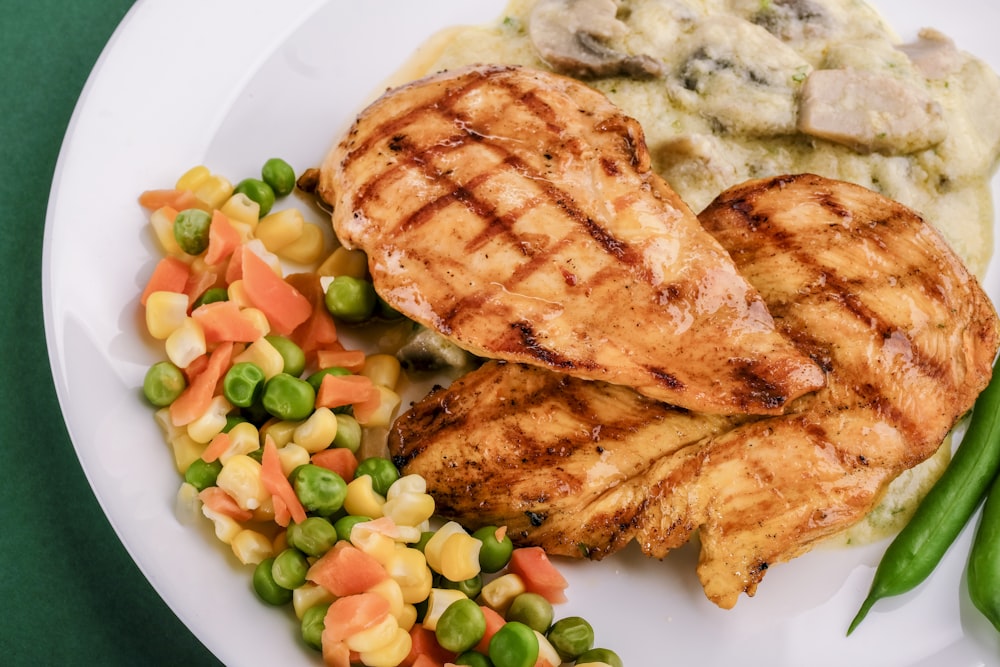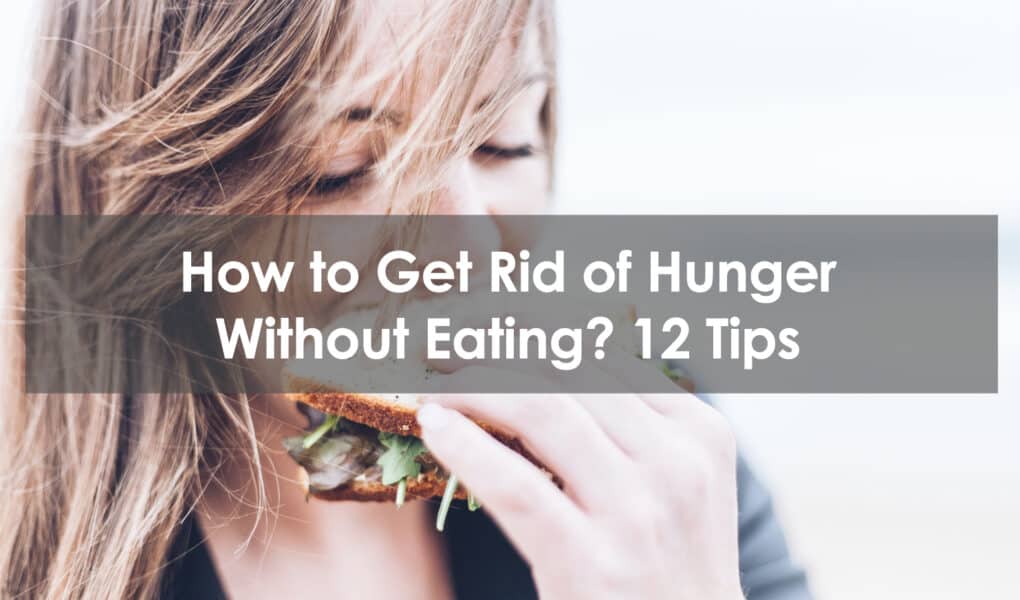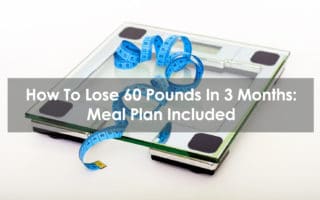In order to lose weight, you need to reduce the number of calories you are eating to achieve a daily caloric deficit. This means that your body is using up more energy than you are giving it in the form of food. As a result, it will draw upon your stored body fat to provide that energy.
Cutting back on calories means that you will probably be faced with hunger. So what can you do to overcome this overriding natural sensation to eat when your goal is not to eat? In this article, I will lay out 12 proven ways to get rid of hunger without eating.
1. Drink More Water

Many people mistake the desire for food for the need for water. Even if you are not actually thirsty, water will fill your stomach and can help curb those hunger pangs. We recommend having a water bottle with you at all times and sipping from it regularly to promote feelings of fullness.
If you feel a really strong urge to eat, drink of full glass of water. You should also replace all of your sodas and sugar-laden beverages, including fruit juices, with water. If you find plain water out of the tap, not to your liking, start drinking carbonated water. It will give you the sensation of a soft drink without sugar.
2. Deep Breathing

Doing some quick breathing exercises is a very effective way to offset hunger pangs. Simply breathe in deeply through the nose and then exhale through the mouth. Perform this action 10 times, thinking about nothing but the breath coming in and going out. This simple exercise can allow you to curb the temptation of food cravings and prevent weight gain.
3. Exercise

Physical activity is one of the best ways to resist food cravings. Get your mind fully engaged in the activity that you’re doing and food will be the last thing that you are thinking about. Whether it is weight resistance training or aerobics exercise, working out will actually enhance your energy levels as your body releases the feel-good endorphins that will crowd out your desire for food and put you in a great mood.
While you should not eat immediately before exercising, we do recommend having a protein–carb combination meal around two hours before your workout in order to provide the glycogen and protein reserves you need to function optimally while exercising.
4. Put Off Eating For a Few Minutes

You do not have to give in to your body’s urges. In fact, resisting the natural desire to eat is one of the greatest evidence of self-control and internal discipline. So, when those hunger pangs come upon you, simply tell yourself that you will wait for five minutes. Then, when that time is up, do a self-analysis to discover if you really are hungry or if that desire for food is in response to emotional hunger or programmed timing rather than physical hunger.
5. Get Social Support

When you are trying to control your food intake, it really helps to have a social support network that you can call upon to help out. That way, when your hunger levels seem to be overwhelming, you can call a friend and distract yourself from those feelings of hunger with a pleasant conversation.
Of course, you could text your friend, but talking on the phone has been shown to be a far more effective tactic to help get your mind away from food.
6. Immerse Yourself in a Hobby

Beating the intense feeling of hunger is all about distraction. Discover a hobby that you love and that you can become immersed in. When you have a desire to eat or a craving for unhealthy foods, get involved in your hobby. Try to do something that is away from the computer and that involves your hands. That way you will be less likely to be munching on junk food as you are doing it.
7. Listen to a Podcast

Along the same distraction lines, find a podcast that really fascinates you. Get your mind involved in what the people are discussing and it will not have any room left to annoy you about how hungry you are. I
If possible, combine this tip with our third suggestion of getting some exercise by going for a walk around your neighborhood as you listen to the podcast.
8. Improve Your Sleep

People who do not get enough sleep are far more likely to overeat. One of the reasons for this is that lack of sleep leads to an increase in levels of the hormone cortisol, as well as elevated levels of the hunger hormone ghrelin. At the same time, the satiation hormone, which promotes feelings of fullness, leptin, decreases its production. That is a recipe for disaster if you are trying to lose body weight and control your hunger levels.
Avoid sleep deprivation by having a set time to go to bed and get up each day, and keep your bedroom dark cool, and technology free.
9. Become a Mindful Eater

Mindfulness is all about being present in the moment. When it comes to eating, most of us do it as a mechanical action without giving it any thought at all. By slowing down, savoring the taste of your food, and chewing each piece of food at least 10 times, you are able to give your body time to absorb and digest what you are putting into it.
Mindful eaters are far more aware of the feelings of fullness and hunger signals. As a result, they are far less likely to snack between meals or give in to hunger temptations.
10. Maintain A Food Diary

Get into the habit of writing down everything you eat in a food diary after your dinner meal. When you do this, you will be far less likely to eat something else that day. Because you have written it down you have put a period on your food intake for the day. Having anything else after that will feel like cheating!
11. Brush Your Teeth

After we brush our teeth, we feel fresh. The last thing we want to do is to eat food. By getting into the habit of brushing your teeth when you feel those hunger pangs coming on, you’ll be able to put off the strong desire to eat for at least half an hour. After that time, the hunger sensation will probably have gone away.
12. Eat Plenty of Protein

By focusing on eating lean protein foods, you will be far less likely to experience hunger pangs between your meals. Protein is the most filling of the three macronutrients. It also has the highest thermic value, meaning that it takes more energy for the body to consume than fats or carbohydrates.
High protein foods are chicken breast, eggs, and fish, you should also consume nutrient-dense fiber-rich foods that fulfilling your stomach and slow down digestion. Great sources of fiber include whole wheat bread, walnuts, broccoli, and berries. Avoid white bread.
Conclusion
When you feel hunger pains coming on, remember the old saying ‘this too will pass.’ In the meantime, make use of the dozen strategies outlined above to ensure that you do not give in to the hunger sensations that may prevent you from achieving your weight loss goals.
Frequently Asked Questions
Is hunger good for you?
Hunger may be good for you so long as you are controlling it. Many people find that intermittent fasting, where you do not eat for a set period of time, is a very effective way to lose weight. This may involve not eating for as long as 40 hours. During that time you will experience some hunger. This is a sign that your body is using stored fat for energy.
What are the three top things I can do to stop my feelings of hunger?
Drinking water regularly is the top tip we would give to control hunger. Next would be making sure that you have good quality sleep. Aim to get 7 to 8 hours of sleep per night. The third thing would be to eat balanced meals, that prioritize protein and fiber content.
How can I stop emotional eating?
To stop emotional eating, you need to start mindful eating. This involves slowing down, taking the time to enjoy your food, and questioning whether you are actually hungry.







